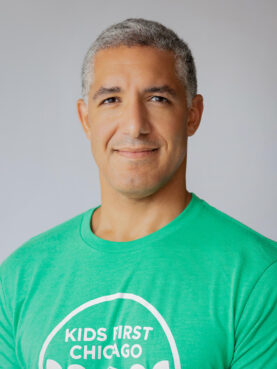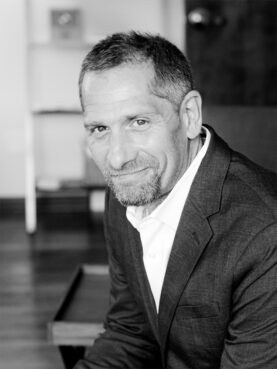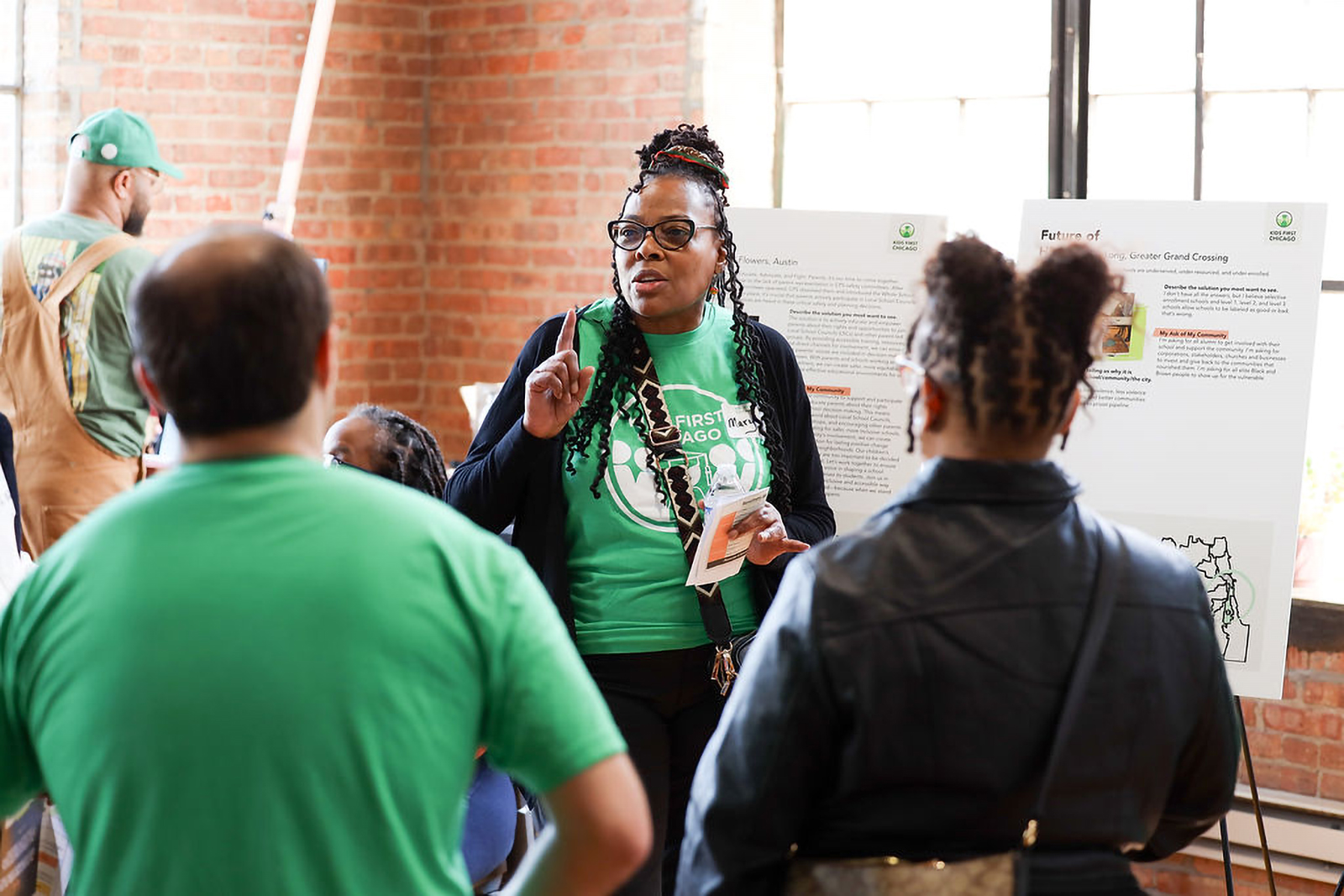
(RNS) — When an impoverished neighborhood’s biggest obstacle is its murder rate, no amount of food donations and micro-loans will alleviate suffering.
Sociologist Kurt Ver Beek knows this firsthand. That’s why, when the struggling Honduran neighborhood of Nueva Suyapa was overrun by a murderous teen gang in the mid-aughts, the Honduras-based organization Ver Beek co-founded, La Asociación para una Sociedad más Justa (in English, the Association for a More Just Society), made radical moves outside the typical Christian nonprofit playbook. The top priority became anti-violence work: supporting victims, equipping police to prosecute crimes and addressing the systemic factors pressuring youths to join gangs in the first place.
The impact was staggering. Homicides in Nueva Suyapa dropped by roughly 75% between 2005 and 2009, a period coinciding with ASJ’s community interventions, according to the organization.
“When it comes to poverty, violence is still not a common issue addressed,” said Ver Beek, who believes that while aid and development work are important, they stop short of addressing root causes of injustice.
Despite the radical impact, ASJ, then a fledgling organization, had largely operated under the radar in Honduras until 2016, when ASJ was invited by Honduras’ president to serve on a commission to purge the National Police Force of corruption. As ASJ became recognized on the national stage, it caught the attention of journalist Ross Halperin, whose book about ASJ, “Bear Witness: The Pursuit of Justice in a Violent Land,” was published in May. And in recent years, ASJ has also shaped the methods of nonprofits in other locations grappling with violence and police corruption — including Chicago.
“We have, in some respects, many of the same problems that they have,” said longtime Chicago-based nonprofit leader Joel Hamernick. “The systems work differently, but I think that that model can be brought to bear here.”
As nonprofits in Chicago ponder how to implement the ASJ approach, Ver Beek knows they’ll face the same questions ASJ has been wrestling with for decades: What is justice, really? Who are you willing to partner with to achieve it? And what, if anything, does faith have to do with it?
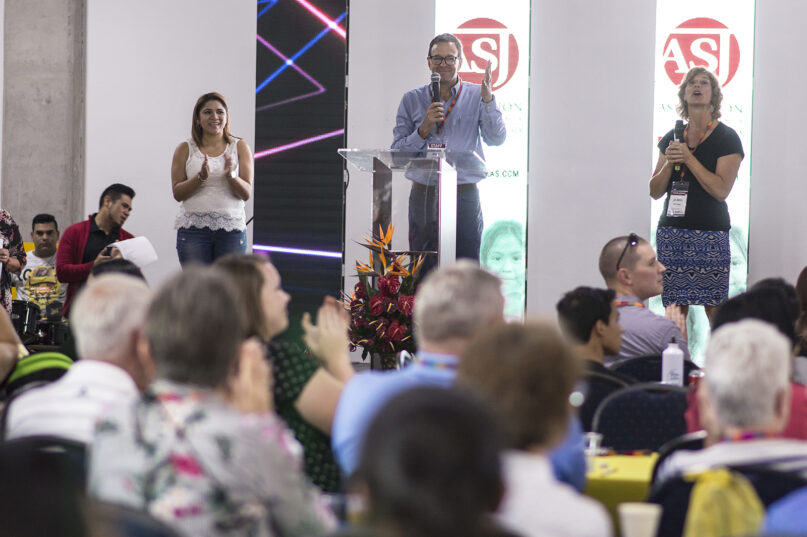
Kurt Ver Beek, center, and his wife, Jo Ann Van Engen, right, at an Association for a More Just Society event. (Photo courtesy of ASJ)
Christianity has always been central to the ASJ mission. Ver Beek and his wife, Jo Ann Van Engen, are graduates of a college affiliated with the Christian Reformed Church in North America, a small, Protestant denomination founded by Dutch immigrants. In 1988, the couple went to Tegucigalpa, Honduras, as employees of the denomination’s international relief arm. A decade later, they founded ASJ as a Christian organization addressing injustice on a deeper, systemic level.
“It’s just part of my faith that I don’t even think about,” Ver Beek told RNS. “Of course we should be doing justice. Of course, if our neighbors are hurting, we don’t just evangelize them; we have to figure out what we can do to help.”
But while Ver Beek told RNS he sees faith as fueling ASJ’s passion for change, he’s under no illusion that Christian nonprofits are more successful than secular ones. The key to ASJ’s impact, Ver Beek argues, is its four-part strategy: researching problems to understand them; building alliances with influential partners; communicating about these efforts with the public and the media; and lobbying decision-makers to make informed changes.
That first step, he says, is one many nonprofits skip.
“They jump in to try and fix things,” said Ver Beek. “They think they understand things, especially they think we understand the life of poor people, what they need, how they need it.”

Maria Estella Núñez. (Courtesy photo)
ASJ has employed this four-part method to tackle challenges across multiple sectors. In 2013, an ASJ-led campaign helped to see the average number of school days in Honduras jump from 125 to over 200. From 2016-2019, ASJ partnered with religious and government leaders to purge the police force of corruption, terminating 42% of police evaluated (5,775 individuals). According to Ver Beek, this contributed to a drop in the entire country’s homicide rate, from 90 murders per 100,000 people in 2012 to 22 murders per 100,000 people in 2024. During the COVID-19 pandemic, an ASJ audit of $80 million in government COVID-related spending found evidence of corruption and improper use of funds, a finding that led to arrests.
ASJ’s growth was fueled by both international recognition and international donors. In 2012, ASJ was formally accredited as an official chapter of Transparency International, becoming a local representative of the global anti-corruption organization. By 2019, it had been recognized for its model of change by global initiatives such as the Paris Peace Forum and the World Justice Challenge. Meanwhile, its sister organization, ASJ-US, was established to spearhead fundraising efforts for the Honduras-based organization. For the 2024 fiscal year, ASJ-US raised over $2 million in support and revenue, and the work of ASJ-Honduras is also funded by 20 other government agencies and foundations. Today, ASJ-Honduras has roughly 60 employees, including researchers, lawyers, therapists and communications professionals.
Though methodical, the ASJ approach is also rooted in the communities it hopes to transform. Psychologist Maria Estella Núñez, who worked on ASJ’s violence prevention program from 2016-2022, spent years mentoring vulnerable youths and teaching families to handle conflict safely and productively.
“They’re not just giving them what they actually need, but they’re also strengthening their capacities at a community level,” said Núñez, who spoke with RNS via an interpreter. “They get to know their rights, but they can also do something about trying to get the authorities to comply with their rights. And once they have this type of knowledge, they can be more empowered, and they can be a more cohesive community.”
Despite ASJ’s success, Halperin’s book on the nonprofit suggests justice can’t be understood as part of a good vs. evil dichotomy. ASJ leaders had to weigh the risks of partnering with local vigilantes and flawed government leaders, and face the ethical implications of locking up teen gang members in inhumane and often deadly prisons. The complexity of justice also means it isn’t always guaranteed.
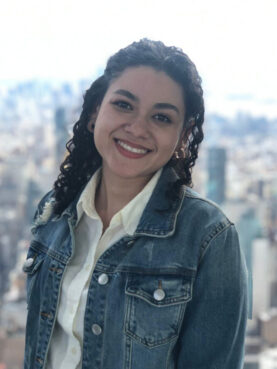
Dineyla Erazo. (Courtesy photo)
That was the case for the family of Dineyla Erazo. Raised in a Christian household in Honduras, Erazo told RNS her family was living in a small town near Tegucigalpa in 2014 when her father, a mechanic, refused to be extorted by local gang members.
“He went to the authorities, presented the complaint, did everything that you’re supposed to do,” said Erazo. “But unfortunately, since he refused to pay the extortion, he was murdered in his own shop.”
After that, Erazo’s family didn’t trust the police. ASJ took up her father’s case, attempting to track down who was responsible while providing the family with psychological assistance. The murderers were never caught.
“We didn’t get justice in a way that we would hope for,” Erazo observed. But, she added, “Just having an organization, the psychologists, helping us go through that process that was like very sudden, very heartbreaking and tragic, to navigate through the whole legal system, was something that we really appreciated.” A decade later, Erazo is ASJ’s deputy director of programs, overseeing fundraising proposals and evaluating ASJ projects.
Undergirding ASJ’s approach is the conviction that justice goes beyond charity and development work to tackle the structural barriers preventing communities from thriving. In recent years, that understanding has inspired nonprofit leaders in the U.S., including Kids First Chicago Executive Director Daniel Anello.
“We have the same way of using research and data to elevate real issues that people are encountering, and wedding numbers with narratives to really compel change,” said Anello. His nonprofit equips parents with data and empowers them to influence decision-makers in the Chicago Public School system. During the 2017-2018 school year, Kids First Chicago conducted focus groups with parents to evaluate a new universal enrollment application for Chicago high schools, advocating for improvements that impacted thousands of families systemwide. In 2020, the nonprofit researched student internet access and led a coalition that advocated for free, in-home internet for over 100,000 Chicago students, paid for by philanthropists and the city of Chicago.
“My first thought about ASJ was, how are they driving this change at scale? They’re seeing governance change. They’re impacting the entire police force,” said Anello, who invited Ver Beek to speak to his nonprofit board.
As the Chicago Public School system begins electing its school board members, Anello hopes Kids First Chicago can broaden the reach of its grassroots-driven research, even in a political context.
Hamernick is also taking cues from ASJ’s model. He believes their four-part strategy could reduce Chicago’s struggles with gun violence, corruption and financial bankruptcy. At the core of these issues, he says, is Chicago’s lack of a city charter — so, for the last six months, he’s been building a new alliance with former officials, clergy, community leaders and foundation heads to call for a charter.
“If you get systems change right, and I think ASJ is one of the few places in the world where you really see that, the benefit to the society is just immeasurably greater,” said Hamernick.
Hamernick has named the alliance A More Just Chicago.

